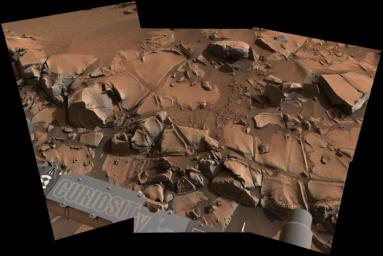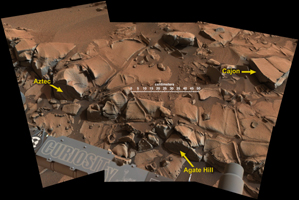
|
Within Rover’s Reach at Mars Target Area ‘Alexander Hills’
- Click the image above for a larger view
- Full-Res JPEG (4188 x 2799) (1.4 MB)
- Full-Res TIFF (4188 x 2799) (35.2 MB)
Caption:

Figure 1
High resolution TIFF file
Click on the image for larger browse version
This view from the Mast Camera (Mastcam) on NASA's Curiosity Mars rover shows a swath of bedrock called "Alexander Hills," which the rover approached for close-up inspection of selected targets.
The mosaic of six Mastcam frames covers an area about 6 feet (2 meters) across. It shows details within the workspace accessible using the rover's robotic arm from the rover's location when the view was acquired. The component exposures were taken on Nov. 23, 2014, during the 817th Martian day, or sol, of Curiosity's work on Mars. The color has been approximately white-balanced to resemble how the scene would appear under daytime lighting conditions on Earth.
Figure 1 is an annotated version showing the location of three targets selected for study -- "Aztec," "Agate Hill" and "Cajon" -- and a 50-centimeter (20-inch) scale bar.
The location of Alexander Hills within the "Pahrump Hills" outcrop at the base of Mount Sharp is indicated on an earlier Mastcam view at PIA19039 .
Background Info:
NASA's Jet Propulsion Laboratory, a division of the California Institute of Technology, Pasadena, manages the Mars Science Laboratory Project for NASA's Science Mission Directorate, Washington. JPL designed and built the project's Curiosity rover. Malin Space Science Systems, San Diego, built and operates the rover's Mastcam.
More information about Curiosity is online at http://www.nasa.gov/msl and http://mars.jpl.nasa.gov/msl/ .
Cataloging Keywords:
| Name | Value | Additional Values |
|---|---|---|
| Target | Mars | |
| System | ||
| Target Type | Planet | |
| Mission | Mars Science Laboratory (MSL) | |
| Instrument Host | Curiosity Rover | |
| Host Type | Rover | |
| Instrument | Mast Camera (MastCam) | |
| Detector | ||
| Extra Keywords | Color | |
| Acquisition Date | ||
| Release Date | 2014-11-25 | |
| Date in Caption | 2014-11-23 | |
| Image Credit | NASA/JPL-Caltech/MSSS | |
| Source | photojournal.jpl.nasa.gov/catalog/PIA19066 | |
| Identifier | PIA19066 | |
